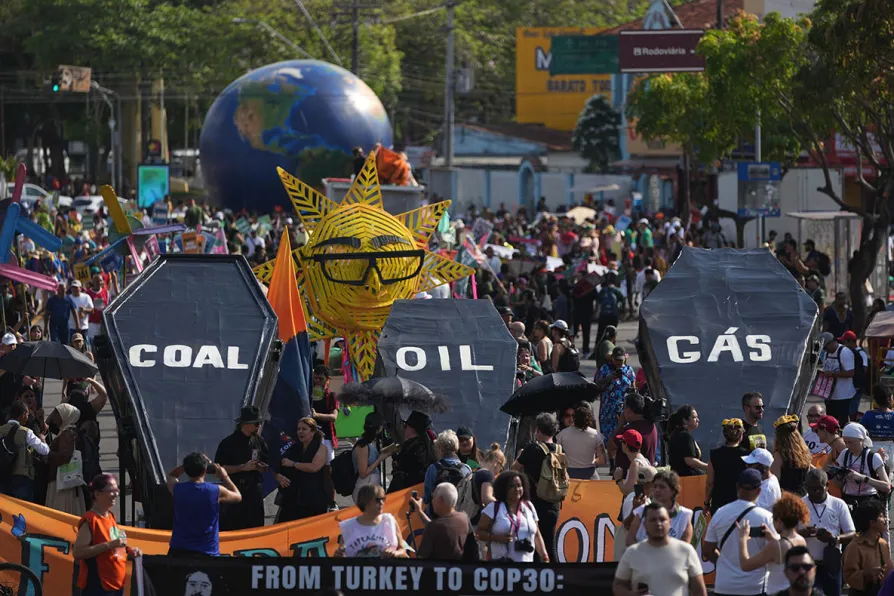
 Climate activists protest with coffins that read coal, oil and gas during the COP30 U.N. Climate Summit, November 15, 2025, in Belem, Brazil
Climate activists protest with coffins that read coal, oil and gas during the COP30 U.N. Climate Summit, November 15, 2025, in Belem, Brazil
HUNDREDS of climate activists protested outside the 30th United Nations Conference of the Parties (Cop30) in Belem at the gateway to the Amazon River on Saturday.
As the climate talks reached the scheduled halfway point, many of the protesters wore black dresses to signify a funeral for fossil fuels. Hundreds wore red shirts, symbolising the blood of colleagues fighting to protect the environment.
Organisers with booming sound systems on trucks with raised platforms directed protesters from a wide range of environmental and social movements. Marisol Garcia, a Kichwa woman from Peru marching at the head of one group, said protesters are there to put pressure on world leaders to make “more humanised decisions.”
The demonstrators walked about 2.5 miles on a route that took them near the main venue for the talks, known as Cop30.
Protesters earlier this week twice disrupted the talks by surrounding the venue, including an incident Tuesday where two security guards suffered minor injuries.
A full day of sessions was planned at the venue, including talks on how to move forward with $300 billion (£229bn) a year in annual climate financial aid that rich countries agreed last year to give to poor nations to help wean themselves off fossil fuels, adapt to a nastier, warmer world and compensate for extreme weather damage.
Protests were heavily restricted at previous climate talks in Azerbaijan, the United Arab Emirates and Egypt.
Youth leader Ana Heloisa Alves said it was the biggest climate march she has been part of. “This is incredible. You can’t ignore all these people,” she said.
Ms Alves was at the march to fight for the Tapajos River, which the Brazilian government wants to develop commercially. “The river is for the people,” her group’s signs read.
Pablo Neri, co-ordinator in the Brazilian state of Para for the Landless Workers’ Movement, an organisation for rural workers, said that organisers of the talks should involve more people to reflect a climate movement that is shifting toward popular participation.
Vitoria Balbina, a regional co-ordinator for the Interstate Movement of Coconut Breakers of Babacu, marching with a group of mostly women activists, called for more access to the trees on private property that provide not only their livelihoods but also a deep cultural significance.
She said that marching is not only about fighting and resistance on a climate and environment front, but also about “a way of life.”
The climate talks are scheduled to run through to Friday.










